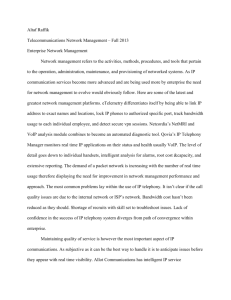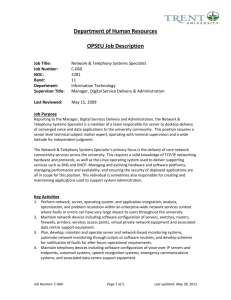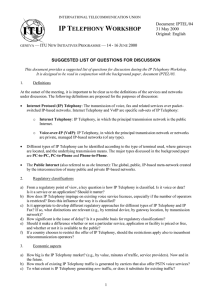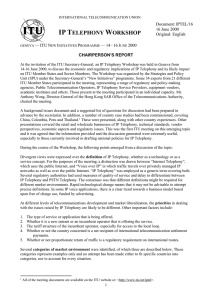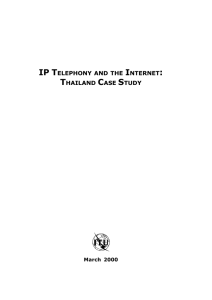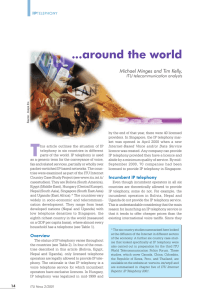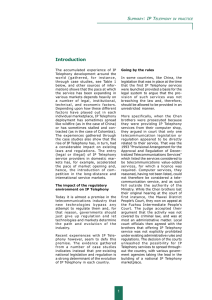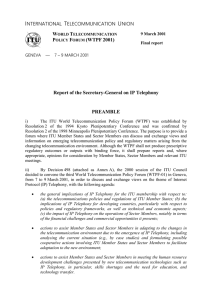I IP T 6 March 2001
advertisement
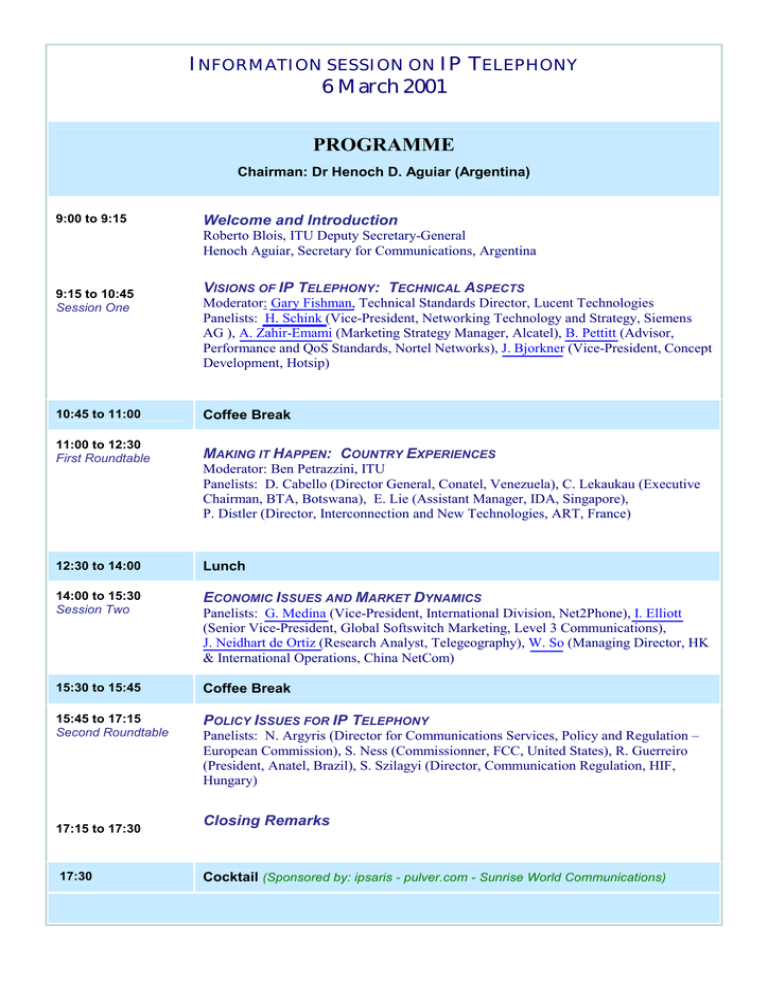
INFORMATION SESSION ON IP TELEPHONY 6 March 2001 PROGRAMME Chairman: Dr Henoch D. Aguiar (Argentina) 9:00 to 9:15 Welcome and Introduction Roberto Blois, ITU Deputy Secretary-General Henoch Aguiar, Secretary for Communications, Argentina 9:15 to 10:45 Session One VISIONS OF IP TELEPHONY: TECHNICAL ASPECTS Moderator: Gary Fishman, Technical Standards Director, Lucent Technologies Panelists: H. Schink (Vice-President, Networking Technology and Strategy, Siemens AG ), A. Zahir-Emami (Marketing Strategy Manager, Alcatel), B. Pettitt (Advisor, Performance and QoS Standards, Nortel Networks), J. Bjorkner (Vice-President, Concept Development, Hotsip) 10:45 to 11:00 Coffee Break 11:00 to 12:30 First Roundtable MAKING IT HAPPEN: COUNTRY EXPERIENCES 12:30 to 14:00 Lunch 14:00 to 15:30 Session Two ECONOMIC ISSUES AND MARKET DYNAMICS Moderator: Ben Petrazzini, ITU Panelists: D. Cabello (Director General, Conatel, Venezuela), C. Lekaukau (Executive Chairman, BTA, Botswana), E. Lie (Assistant Manager, IDA, Singapore), P. Distler (Director, Interconnection and New Technologies, ART, France) Panelists: G. Medina (Vice-President, International Division, Net2Phone), I. Elliott (Senior Vice-President, Global Softswitch Marketing, Level 3 Communications), J. Neidhart de Ortiz (Research Analyst, Telegeography), W. So (Managing Director, HK & International Operations, China NetCom) 15:30 to 15:45 Coffee Break 15:45 to 17:15 Second Roundtable POLICY ISSUES FOR IP TELEPHONY 17:15 to 17:30 17:30 Panelists: N. Argyris (Director for Communications Services, Policy and Regulation – European Commission), S. Ness (Commissionner, FCC, United States), R. Guerreiro (President, Anatel, Brazil), S. Szilagyi (Director, Communication Regulation, HIF, Hungary) Closing Remarks Cocktail (Sponsored by: ipsaris - pulver.com - Sunrise World Communications) Session 1 VISIONS OF IP TELEPHONY: TECHNICAL ASPECTS Internet Protocol (IP)-based networks are increasingly being used in addition to traditional circuit-switched networks for carrying voice traffic. In fact, while this is a sign of choice between competing technologies, it also suggests future trends towards convergence. In order to understand the implications of IP Telephony, it is essential to grasp its main technical characteristics. This session will examine IP-based networks and the use of the Internet Protocol in other networks, operations and performance aspects, application development and transition strategies. St 1 Roundtable MAKING IT HAPPEN: COUNTRY EXPERIENCES The regulatory treatment of IP Telephony varies significantly from country to country. Some regulators have banned its use, either explicitly or implicitly, some permit or even encourage it, but the majority of regulators have yet to formally address the issue. This session will set the stage for the Policy Issues Roundtable, and serve as a forum for countries to share their experiences and discuss various regulatory approaches. Session 2 ECONOMIC ISSUES AND MARKET DYNAMICS This session will address the main economic issues raised by IP Telephony. The growth of IP-based networks around the globe has profound and broad implications for societies, including consumers, industry, and national administrations. In part, this is because telecommunication infrastructure is increasingly viewed as a fundamental element of national competitiveness. For enterprises and consumers, IP Telephony offers low-cost long distance and international telephone calling as well as advanced, integrated services. For PTO's, IP Telephony presents opportunities and challenges. While IP Telephony can help national administrations advance national policy objectives designed to improve the performance, cost and range of services offered by telecommunication networks, incumbent PTOs have existing revenue streams and technologies that may be impacted if customers shift to other services or other companies. This session will provide an assessment of the state of IP Telephony, the market opportunities that it is creating and its impact on business models. nd 2 Roundtable POLICY ISSUES FOR IP TELEPHONY The Forum aims to assist Member States in adapting to the changes in the telecommunication environment brought about by the emergence of IP Telephony. The PolicyRoundtable will consider the main policy issues raised by IP Telephony, including economic and regulatory aspects. In so doing, the panelists will examine the role for government in meeting consumer interests and facilitating infrastructure investment during service and network transition. The issues to be discussed will include the status of IP Telephony under existing or newly created frameworks, the challenges it poses for Universal Service schemes, the economic impact on public telecommunication operators (particularly in developing countries), cross-border concerns, convergence, and human resource development. The roundtable will consist of regulators from countries at different stages of market liberalization.
